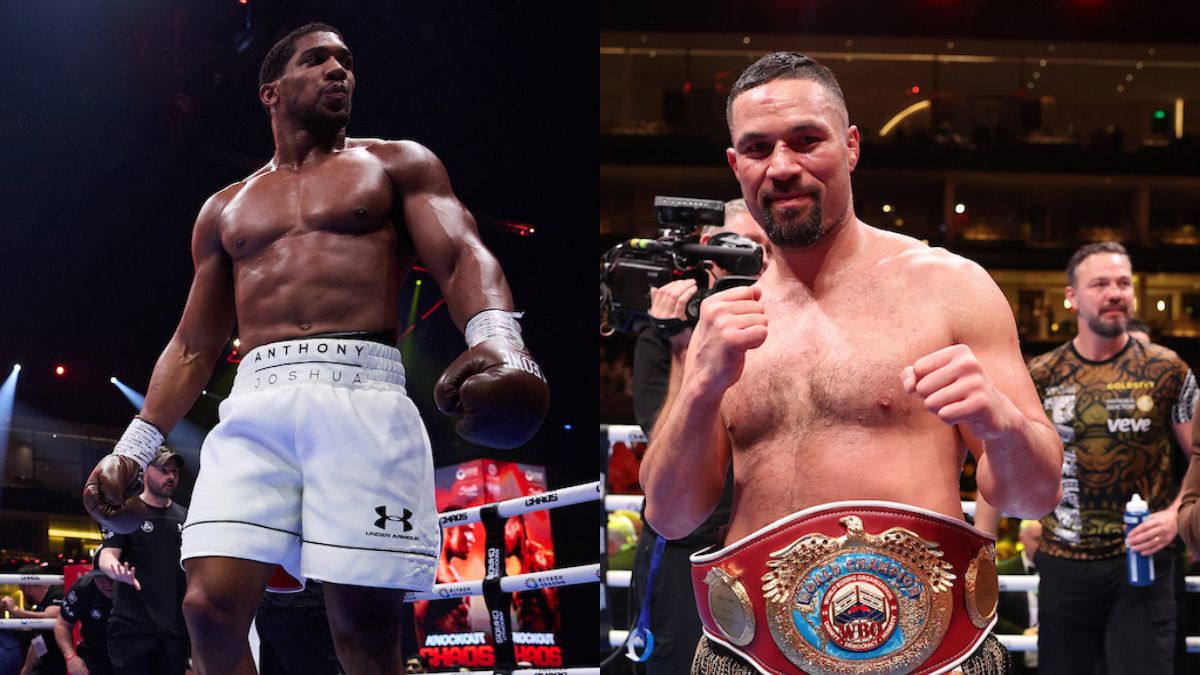Joshua and Parker prove that being active is key to a successful career
It is commonly known in sport, irrespective of discipline, that athletes need repetitive competition in order to achieve peak performance. Just as footballers need regular minutes to be fully match fit and sharp, boxers from amateur to professional level seek activity in order to avoid the old adage of ring rust.
Contrasting with their combat sport rival of MMA however, once reaching a certain level of notoriety, within elite level boxing this tends to be forgotten, with the top names in the sport often only getting out once per year. In recent times, pound for pound stars Canelo Alvarez and Devin Haney have gone against the grain in this respect, getting out much more frequently, with their star status rising alongside it.
It is within the land of the giants over the past 18 months that we have seen just how transformative frequent activity, and contrastingly lack thereof, can be to fighters’ careers.
No career story arc optimises this more so than that of former WBO title holder Joseph Parker, where over the last 18 months we have witnessed one of the most remarkable career turnarounds in recent memory.
Parker is a fighter who has always had a reputation throughout the industry of being both one of boxing’s nice guys, as well as someone willing to consistently face the best in the division, however 18 months ago it appeared his exciting career may be reaching its twilight, following a bruising 11th round knockout defeat to ‘The Juggernaut’ Joe Joyce.
Fast forward to the current day, and after five victories within that time frame, the big New Zealander has the interim WBO bauble around his waist, but, even more impressively, is coming off of back-to-back wins over boxing behemoths Deontay Wilder and Zhilei Zhang, two of the previously most feared fighters in the weight class.
What was key in Joseph Parker being selected as a worthy adversary for Deontay Wilder in the first place, despite the emphatic defeat to Joyce, was the fact that he had momentum since that bout. In this period Parker accumulated three victories on the bounce within the space of 10 months, the third of which was a three round demolition job over the world ranked, albeit untested, Canadian puncher Dempsey Kean.
In the bout with ‘The Bronze Bomber’, it was overwhelmingly evident how the formerly most feared man in the sport was lacking his usual sharpness, aggression and accuracy, unable to pull the trigger and even come close to landing his lethal right hand equaliser. Having fought only one competitive round in the previous 26 months, in hindsight one wonders why the eventual wide decision win for Parker came as such a surprise at all.
On the same bill as the Wilder upset defeat, we saw a resurgent Anthony Joshua pick up his third and most impressive victory since the second defeat to Oleksandr Usyk, looking back to his former destructive seek and destroy style, busting up and stopping the crafty Swede, Otto Wallin, a man many predicted would pose a serious threat to the former unified champ.
Four months on and Joshua has secured his biggest win of this latest run, not in terms of quality of opponent, but certainly in terms of magnitude of event, dropping the Cameroonian former UFC champion Francis Ngannou three times, the third rendering him unconscious in the second round in one of the most devastating knockouts we will see this year.
This one-sided destruction was a remarkably different story to what we saw when the WBC heavyweight king Tyson Fury battled Ngannou, stumbling across the finish line, having being knocked down earlier, with a controversial split decision victory. Fury’s activity before that fight? One outing in 18 months. Again you see a familiar correlation emerging between level of performance and frequency of activity.
Whatever the reason for his dormancy, be that a reluctance to go through tough camps in quick succession or perhaps pricing themselves out of certain match ups, with the examples of Deontay Wilder and Tyson Fury, we can see that they may well actually be losing out on opportunities and earnings in the long run.
Had Wilder have fought more frequently, could he have had the sharpness required to land his signature fight-ending right on Joseph Parker to set up the previously agreed meeting with Joshua? In the case of Tyson Fury, on another night with different judges, his inactivity could have easily cost him his biggest fight and pay day of his career with Oleksandr Usyk.
In reflection of the starkly different ways that the careers of opposing duo’s of Parker and Joshua vs Fury and Wilder have played out over the past 18 months, hopefully other fighters will take notice of the effect that more frequent outings has on ring performances. Activity breeds momentum, and momentum creates opportunities.
Boxing really is in the best place it has been for some time in terms of the best fighting the best. If we were able to increase the level of activity across the board for the rest of the sports elite, it really would be the icing on the cake in catapulting boxing back into its glory days of years gone by.

